Key Stage 4 Subjects- Overview
At Key Stage 4, students will undertake a 2-year program of IGCSEs. Most students are likely to be around the age of 14 to 16 but we also welcome mature students. At Visions High, we use the Cambridge International GCSEs over the traditional GCSE courses as we believe they help students to be better prepared for A level study. These qualifications are internationally recognized by the world’s best universities and employers, giving students a wide range of options in their education and career.
The role of the Teachers
Our teachers will be available for contact by email and through the online portal. Teachers will be primarily involved in the academic affairs of the students but students will have the opportunity to ask questions during the live teaching sessions. Teachers will also be there to pass any concerns to the administration.
The role of the Parents
We at Visions High understand that students who choose our school will do so for a variety of reasons. We also understand that parents have an important role to play to encourage and follow up with their children at this delicate age. This will include acting as a supporter, motivator friend and advisor.
Why Cambridge IGCSEs?
Cambridge qualifications are globally recognised for their strength of content and academic standard. Cambridge qualifications are part of the University of Cambridge. These examinations help prepare students for life, helping them develop an informed curiosity and a lasting passion for learning.
Qualifications from Cambridge are created by subject experts, rooted in academic rigor and reflect the latest educational research. They provide a strong platform for learners to progress from one stage to the next, and are well supported by teaching and learning resources.
Every year, nearly a million Cambridge students from 10 000 schools in 160 countries prepare for their future with an international education from Cambridge.
Examinations and Hours of Study
The Cambridge IGCSE examinations can be taken via the British Council located in most parts of the world. The exams are assessed after two years of study making it suitable for students to study online and gain competence and confidence in each subject.
The IGCSE syllabuses are designed with at least 130 hours of direct teaching in mind for each subject. This amount is only a guide and does not include private study that will be expected from each student.
Key Features of Cambridge IGCSE English - First Language 0500 (International) / 0990 (UK only)
Cambridge IGCSE First Language English is designed for students whose first language is English. Non-native English speakers who are fluent in the language can also apply for this course.
The course enables students to:
- develop the ability to communicate clearly, accurately and effectively when speaking and writing
- use a wide range of vocabulary, and the correct grammar, spelling and punctuation
- develop a personal style and an awareness of the audience being addressed.
Students are also encouraged to read widely, both for their own enjoyment and to further their awareness of the ways in which English can be used. Cambridge IGCSE First Language English also develops more general analysis and communication skills such as inference, and the ability to order facts and present opinions effectively.
The Syllabus and the Exam
Students will study the course objectives for English Language 0500. UK students will also study the same course objectives but because the grading criteria has changed, they will take the 0990 syllabus.
At the end of the course, students will sit two written papers (Papers 1 and 2) each consisting of 50% of the total mark.
Required Resources
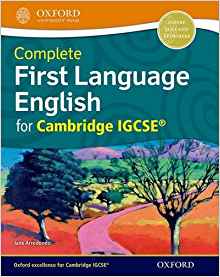
Student Book: Complete First Language English for Cambridge IGCSE £29.00
Workbook: Complete First Language English Workbook £10.00
+ Additional readings assigned by the teacher.
Key Features of Cambridge IGCSE Mathematics 0580 (International)/ 0980 (UK only)
Cambridge IGCSE Mathematics encourages the development of mathematical knowledge as a key life skill, and as a strong basis for more advanced study. The syllabus aims to build students’ confidence by helping them develop competence and fluency with mathematical concepts, methods and skills, as well as a feel for numbers, patterns and relationships. The syllabus also places a strong emphasis on solving problems and presenting and interpreting results. Students also gain an understanding of how to communicate and reason using mathematical concepts.
The Syllabus and the Exam
Students will study the course objectives for Mathematics 0580. UK students will also study the same course objectives but because the grading criteria has changed, they will take the 0980 syllabus.
At the end of the course, students will sit two written papers from either:
Papers 2 and 4 worth 35% and 65% respectively for candidates expecting Grade A* to C.
Papers 1 and 3 worth 35% and 65% respectively for candidates expecting Grade C at most.
Required Resources
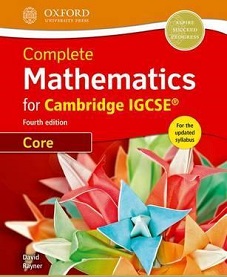
Mathematics Student Book:
Complete Mathematics for Cambridge IGCSE £27.00
Workbook:Complete Mathematics for Cambridge Workbook £10.00
Key Features of Cambridge IGCSE Chemistry 0620 (International)/ 0971 (UK only)
The Cambridge IGCSE Chemistry syllabus enables students to understand the technological world in which they live, and take an informed interest in science and scientific developments. Students gain an understanding of the basic principles of Chemistry through a mix of theoretical and practical studies. They also develop an understanding of the scientific skills useful for everyday life.
As they progress, learners understand how science is studied and practiced, and become aware that the results of scientific research can have both good and bad effects on individuals, communities and the environment.
The Syllabus and the Exam
Students will study the course objectives for Chemistry 0620. UK students will also study the same course objectives but because the grading criteria has changed, they will take the 0971 syllabus.
At the end of the course, students will sit three written papers from either:
Papers 2, 4 and 6 worth 30%, 50% and 20% respectively for candidates expecting Grade A* to C.
Papers 1, 3 and 6 worth 30%, 50% and 20% respectively for candidates expecting Grade C at most.
Required Resources
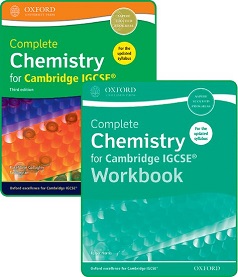
Student Book: Complete Chemistry for Cambridge IGCSE £27.00
Workbook: Complete Chemistry for Cambridge – Workbook £9.00
+ Lab equipment
Key Features of Cambridge IGCSE Physics 0625 (International)/ 0972 (UK only)
The Cambridge IGCSE Physics syllabus helps students to understand the technological world in which they live, and take an informed interest in science and scientific developments. They learn about the basic principles of Physics through a mix of theoretical and practical studies. Students also develop an understanding of the scientific skills essential for further study at Cambridge International A Level, skills which are useful in everyday life.
As they progress, learners gain an understanding of how science is studied and practiced, and become aware that the results of scientific research can have both good and bad effects on individuals, communities and the environment.
The Syllabus and the Exam
Students will study the course objectives for Physics 0625. UK students will also study the same course objectives but because the grading criteria has changed, they will take the 0972 syllabus.
At the end of the course, students will sit three written papers from either:
Papers 2, 4 and 6 worth 30%, 50% and 20% respectively for candidates expecting Grade A* to C.
Papers 1, 3 and 6 worth 30%, 50% and 20% respectively for candidates expecting Grade C at most.
Required Resources
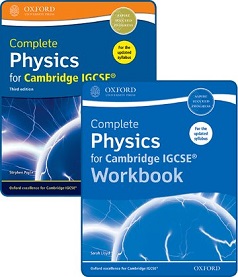
Student Book: Complete Physics for Cambridge IGCSE £27.00
Workbook: Complete Physics for Cambridge – Workbook £9.00
+ Lab equipment
Key Features of Cambridge IGCSE Biology 0610 (International)/ 0970 (UK only)
With an emphasis on human biology, the Cambridge IGCSE Biology syllabus helps students to understand the technological world in which they live, and take an informed interest in science and scientific developments. Students gain an understanding of the basic principles of biology through a mix of theoretical and practical studies. They also develop an understanding of the scientific skills essential for further study.
As they progress, students understand how science is studied and practised, and become aware that the results of scientific research can have both good and bad effects on individuals, communities and the environment.
The Syllabus and the Exam
Students will study the course objectives for Biology 0610. UK students will also study the same course objectives but because the grading criteria has changed, they will take the 0970 syllabus.
At the end of the course, students will sit three written papers from either:
Papers 2, 4 and 6 worth 30%, 50% and 20% respectively for candidates expecting Grade A* to C.
Papers 1, 3 and 6 worth 30%, 50% and 20% respectively for candidates expecting Grade C at most.
Required Resources
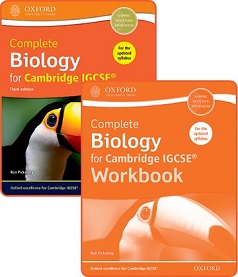
Student Book: Complete Biology for Cambridge IGCSE £27.00
Workbook: Complete Biology for Cambridge – Workbook £9.00
+ Lab equipment
Key Features of Cambridge IGCSE Geography 0460 (International)/ 0976 (UK only)
Through the Cambridge IGCSE Geography syllabus, students will develop a ‘sense of place’ by looking at the world around them on a local, regional and global scale. Students will examine a range of natural and man-made environments, and study some of the processes which affected their development. They will also look at the ways in which people interact with their environment, and the opportunities and challenges an environment can present, thereby gaining a deeper insight into the different communities and cultures that exist around the world.
The Syllabus and the Exam
Students will study the course objectives for Geography 0460. UK students will also study the same course objectives but because the grading criteria has changed, they will take the 0976 syllabus.
At the end of the course, students will sit three written papers: Paper 1 (45%), Paper 2 (27½%) and Paper 4 (27½%)
Required Resources
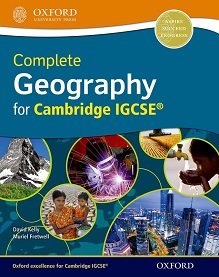
Student Book: Complete Geography for Cambridge IGCSE £29.00
Workbook: Complete Geography for Cambridge – Workbook £9.00
Key Features of Cambridge IGCSE History 0470 (International)/ 0977 (UK only)
The Cambridge IGCSE History syllabus looks at some of the major international issues of the nineteenth and twentieth centuries, as well as covering the history of particular regions in more depth. The emphasis is on both historical knowledge and on the skills required for historical research.
Students develop an understanding of the nature of cause and effect, continuity and change, similarity and difference and find out how to use and understand historical evidence as part of their studies. Cambridge IGCSE History will stimulate any learner already interested in the past, providing a basis for further study, and also encouraging a lifelong interest in the subject.
The Syllabus and the Exam
Students will study the course objectives for History 0470. UK students will also study the same course objectives but because the grading criteria has changed, they will take the 0977 syllabus.
At the end of the course, students will sit three written papers: Paper 1 (40%), Paper 2 (33%) and Paper 4 (27%)
Required Resources
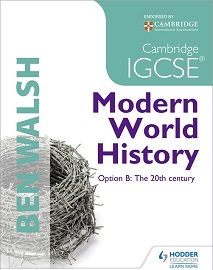
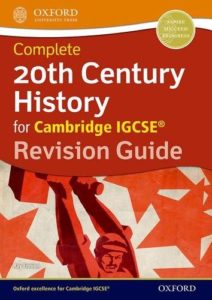
Student Books
Key Features of Cambridge IGCSE Business Studies 0450 (international) / 0986 (UK only)
The Cambridge IGCSE Business Studies syllabus develops students’ understanding of business activity in the public and private sectors, and the importance of innovation and change. Students find out how the major types of business organisation are established, financed and run, and how their activities are regulated. Factors influencing business decision-making are also considered, as are the essential values of cooperation and interdependence.
Students not only study business concepts and techniques but also enhance related skills such as numeracy and enquiry. The syllabus provides both a foundation for further study at Cambridge International A Level and an ideal preparation for the world of work.
The Syllabus and the Exam
Students will study the course objectives for Business Studies 0450. UK students will also study the same course objectives but because the grading criteria has changed, they will take the 0986 syllabus.
At the end of the course, students will sit two written papers (Papers 1 and 2) each consisting of 50% of the total mark.
Required Resource
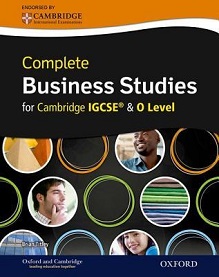
Student Book: Complete Business Studies for Cambridge IGCSE £32.00
Key Features of Cambridge IGCSE Economics 0455 (International and UK)
The Cambridge IGCSE Economics syllabus develops an understanding of economic theory, terminology and principles. Students study the economics of different countries and how these interrelate. They also learn to work with simple economics data and to use the tools of economic analysis. Students apply understanding of economics to current economic issues.
The Syllabus and the Exam
Students will study the course objectives for Economics (0455)
At the end of the course, students will sit two written papers -Paper 1 (30%) and Paper 2 (70%).
Required Resources

Student Book: Complete Economics for Cambridge IGCSE & O Level £29.00
Workbook: Complete Economics Workbook for Cambridge IGCSE £9.00
Key Features of Cambridge IGCSE Accounting 0452 (International and UK)
The Cambridge IGCSE Accounting syllabus introduces students to the theory and concepts of accounting and the ways in which accounting is used in a variety of modern economic and business contexts. Students focus on the skills of recording, reporting, presenting and interpreting financial information and build an ideal foundation both for further study and for a future career within the profession.
The Syllabus and the Exam
Students will study the course objectives for Accounting (0452).
At the end of the course, students will sit two written papers -Paper 1 (30%) and Paper 2 (70%).
Required Resource

Student Book: Complete Accounting for Cambridge IGCSE & O Level £25.00
Key Features of Cambridge IGCSE Arabic - First Language (0508)
The Cambridge IGCSE First Language Arabic syllabus is designed for students whose first language is Arabic. This First Language syllabus develops learners’ ability to communicate clearly, accurately and effectively. They learn how to employ a wide-ranging vocabulary, use correct grammar, spelling and punctuation, and develop a personal style and an awareness of the audience being addressed.
Learners are also encouraged to read widely, both for their own enjoyment and in order to develop an appreciation of how writers achieve their effects. The syllabus also complements other areas of study by encouraging skills of more general application.
The Syllabus and the Exam
Students will study the course objectives for Arabic (0508). This syllabus is only available to students who will sit the examination in Cambridge administrative zones 3 and 4 from 2020.
This examination cannot be taken simultaneously with Arabic as a Foreign Language (0544)
At the end of the course, students will sit two written papers (Papers 1 and 2) each consisting of 50% of the total mark.
Useful Resources
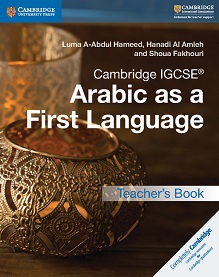
Student Book: Cambridge IGCSE Arabic as a First Language £28.00
Workbook: Cambridge IGCSE Arabic as a First Language £8.00
The teacher will advise which books to purchase for this course.
Key Features of Cambridge IGCSE Arabic - Foreign Language (0544)
This is designed for students who are learning Arabic as a foreign language. The aim is to develop an ability to use the language effectively for purposes of practical communication. The course is based on the linked language skills of listening, reading, speaking and writing, and these are built on as students progress through their studies.
The syllabus also aims to offer insights into the culture and civilization of countries where Arabic is spoken, thus encouraging positive attitudes towards language learning and towards speakers of foreign languages.
The Syllabus and the Exam
Students will study the course objectives for Arabic as a Foreign Language (0544).
This examination cannot be taken simultaneously with Arabic Language (0508). Please note that this examination can only be taken in June.
At the end of the course, students will sit two written papers (Papers 2 and 4) each consisting of approximately 33% of the total mark. There will also be a speaking examination (Paper 3) that is to be assessed internally and moderated externally. This paper will also be worth approximately 33% of the total mark.
Required Resources
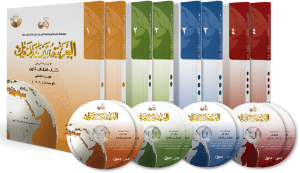
Student Book: Al Arabiyah Baina Yadaik
These books can be purchased and downloaded from this website: https://www.arabiyyah.com/downloads/
The teacher will advise which book to purchase.
Key Features of Cambridge IGCSE Islamic Studies (0493)
This syllabus enables students to develop an understanding of the importance of Islam, its Pillars and Beliefs and of the early history of the Islamic community. As a result, students develop their knowledge and understanding of the main elements of Islamic faith and history, evaluating the meaning and importance of these elements in the lives and thoughts of Muslims. Although the syllabus is studied in English, some familiarity with passages from the Qur’an and Hadith in Arabic is assumed.
The Syllabus and the Exam
Students will study the course objectives for Islamic Studies (0493). This syllabus is only available to students who will sit the examination in Cambridge administrative zones 2, 3, 4 and 5 from 2020.
At the end of the course, students will sit two written papers (Papers 1 and 2) each consisting of 50% of the total mark.
Required Resources
The teacher will advise which books to purchase.
Key Features of Cambridge IGCSE Computer Science 0478 (International) / 0984 (UK only)
Students following the Cambridge IGCSE Computer Science syllabus develop their understanding of the main principles of problem solving using computers. They can apply their understanding to develop computer-based solutions to problems using algorithms and a high-level programming language. Students also develop a range of technical skills, as well as being able to effectively test and evaluate computing solutions.
Studying Cambridge IGCSE Computer Science will help learners appreciate current and emerging computing technologies, the benefits of their use and recognize their potential risks. Cambridge IGCSE Computer Science helps learners develop an interest in computing and gain confidence in computational thinking.
The Syllabus and the Exam
Students will study the course objectives for Computer Science (0478). UK students will also study the same course objectives but because the grading criteria has changed, they will take the 0984 syllabus.
At the end of the course, students will sit two written papers: Paper 1 (60%) and Paper 2 (40%).
Required Resource
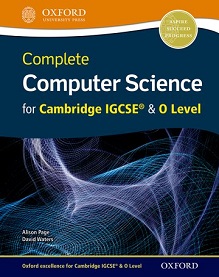
Student Book: Complete Computer Science for Cambridge IGCSE £25.00
Key Features of Cambridge IGCSE Information and Communication Technology 0417
The Information Communication Technology syllabus encourages students to develop lifelong skills, which will be useful for future employment. They will develop understanding of the impact of technology in society, including social, economic and ethical uses.
The syllabus combines theoretical and practical studies focusing on the ability to use common software applications to solve problems, including word processors, spreadsheets, databases, interactive presentation software, web browsers and website design. Students will be expected to analyse, design, implement, test and evaluate ICT systems.
The Syllabus and the Exam
Students will study the course objectives for Information and Communication Technology 0417
At the end of the course, students will sit three written papers: Paper 1 (40%), Paper 2 (30%) and Paper 3 (30%)
Required Resource

Student Book: Complete ICT for Cambridge IGCSE £34.50
Key Features of Cambridge IGCSE English Literature (0475) International/ 0992 (UK)
The English Literature syllabus enables students to read, interpret and evaluate texts through the study of literature in English. Students develop an understanding of literal meaning, relevant contexts and of the deeper themes or attitudes that may be expressed. Through their studies, they learn to recognise and appreciate the ways in which writers use English to achieve a range of effects, and will be able to present an informed, personal response to the material they have studied.
The syllabus also encourages the exploration of wider and universal issues, promoting students’ better understanding of themselves and of the world around them.
The Syllabus and the Exam
Students will study the course objectives for English Literature (0475). UK students will also study the same course objectives but because the grading criteria has changed, they will take the 0992 syllabus.
At the end of the course, students will sit either two or three written papers:
Either: Paper 1 (50%) and Paper 2 (50%) OR: Paper 1 (50%), Paper 3 (25%), Paper 4 (25%).
The teacher will advise students accordingly.
Required Resources
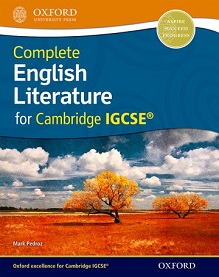
Student Book: Complete English Literature for IGCSE £24.99
Workbook: £9.99
+ Recommended reading as suggested by the teacher.
Scholarship Facility
For deserving candidates who want to excel but do not have necessary resources to achieve the same.
Skilled Lecturers
Our teachers are some of the best in the industry, having professional experience in the field of High school education.
Academic Resources
Our academic resources are immense and easily available to all our students, ensuring constant transfer of knowledge.
